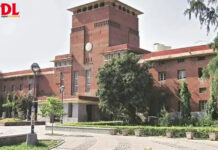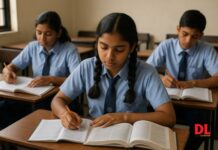The Indira Gandhi National Open University's (IGNOUs) School of Computer and Information Sciences (SOCIS) has revised its syllabus for Bachelor's in Computer Application (BCA) from July 2011 cycle of admission. With the launch of revised syllabus, the existing BCA (pre-revised syllabus) would be discontinued from July 2011. Accordingly, no fresh admission would be made in BCA (pre-revised syllabus) from July 2011 cycle onwards. A communication has been sent to all those prospective students who have applied for BCA programme through the Admission Form contained in the Common Prospectus of Jan. 2011. All such candidates are also required to remit the difference fee of Rs.200/- Students already registered in BCA (pre-revised syllabus) up to Jan.2011 cycle of admission would continue their studies in the same syllabus and no change from BCA (pre-revised syllabus) to BCA (revised syllabus) would be permitted. With the revision in the syllabus, the admission eligibility criteria, the duration of the programme (minimum 3 years and maximum 6 years) and the programme fee (Rs. 4500/- per semester), remains the same. The student attendance for theory counseling sessions has no compulsion however, the counseling sessions of Lab courses requires 70% compulsory attendance. The basic objective of the BCA (Revised) programme is to open a channel of admission for computing courses for students who have done their 10+2 and are interested in taking computing/IT as a career. After acquiring the Bachelor's Degree (BCA) at IGNOU, there is further educational opportunity to go for an MCA at IGNOU or Master's Programme at any other University/Institute. Also after completing BCA Programme, a student should be able to get entry level job in the field of Information Technology.
Onus on principals to bring back drop-outs
Alarmed over the staggering number of children who are not attending schools, the Rajasthan government has directed that each government principal be given a target to bring back students who have dropped out. According to a child tracking system (CTS) survey conducted by the state's education department, 1.2 million students are out of schools in Rajasthan. And the state's Directorate of Primary Education in Bikaner moved last week to rectify the situation. “District education officers (DEO) have been asked to provide the list of drop-out children to government school principals in each district,” a senior education department officer told the sources. “Based on the ratio of drop-out children and the government teachers in each school, the teachers will be given targets. They will have to bring these children to schools,” he explained. It will be the responsibility of the principals to ensure that children who get admission in their schools stay till they complete the education, he added. “The orders regarding this were issued on Saturday,” he said. The directorate also plans to run special drives to bring drop-out children to school from May 1 to May 16 and July 1 to July 15 this year. “We have sought permission regarding this from the state government and the programme details will be announced as soon as we get the nod,” said the officer. According to the CTS survey, at least 30,996 children between the age group 6-14 are not going to school in the state capital Jaipur alone. Child rights activists in the state say the orders will have to be implemented strictly for positive results. “It is still not clear what action will be taken against the teachers who fail to meet the given targets,” said Vikram Sharma, an activist.
MCI move to allow MBBS students to visit patient wards
As part of the new curriculum for undergraduate medical students, the Medical Council of India had decided to introduce a new kind of training or “clerkship” under which medical students will be able to experience the feeling of being a real doctor. Under the training, undergraduate medical students will be able to have ward visits, patient interaction as well as doing evening rounds from the second year of the MBBS course itself. Medical students will be attached to resident doctors and would be able to accompany them during rounds of the hospital, helping managing patients and talking to them. This would help undergraduate medical students in improving their communication skills and also help patients in coping better with their illnesses. However, the undergraduate students will not be allowed to treat patients. Member of MCI's governing body Dr. Sita Naik said that the current medical training is classroom oriented and boring and that the MCI is considering reviving a practice that had existed 20 years earlier wherein undergraduate students were assigned to wards. The students were then able to help resident doctors with managing patients but not prescribing treatments. Dr. Naik further added that the practice would give them early clinical exposure. “From the second year itself, students will be allowed to have access to wards and clinics and this would help them in feeling that they are a part of the clinical practice. “Currently, students do not go to wards. They are instead taught anatomy and physiology in the classrooms. The practice of students assisting resident doctors was stopped in the last 20 years as medical training had become more classroom based.” she said. She further stated that this may have been because too many students were assigned to one resident doctor. The system will now be reintroduced by the MCI in order to make medical education more clinical and less classroom based. The meeting to finalize the new undergraduate and postgraduate curriculum for medical courses will be held on March 29. The meeting will be chaired by union health secretary K. Chandramouli and will be attended by to academicians as well as vice chancellors. MCI says that at the end of undergraduate medical training after the new curriculum is implemented, students will be able to perform a complete and thorough physical examination of any organ system in the body and also perform basic clinical tasks.
Educomp adds 540 schools under ICT implementation
Educomp's ICT Division Edureach has added 540 Government Schools to their existing portfolio of 10,550 schools under ICT implementation across India. Now Total Number of schools under EduReach Portfolio is 11,090 and Company is working with 10 State Governments. Educomp Edureach has received the LOI on 9th March, 2011 from the Director Education (Secondary & Higher Secondary Education), Government of Maharashtra, for the implementation of ICT@Schools Project -Phase 2 in two regions namely Nasik & Latur totaling 540 Secondary and Higher Secondary Schools covering class V to XII. The total worth of the order is Rs. 67.93 crores. The project will be implemented in Build, Own, Operate and Transfer (BOOT) Model for a period of five years including supply and maintenance of Computer Hardware, Software and Lab Accessories, provision for computer faculty in each school, training of school teachers every year, provision of computer educational services including deploying & running school management software, multimedia educational software as per-state board curriculum, providing computer education, courses on spoken English communication skills, safe usage of internet and awareness on cybercrime. Mr. Soumya Kanti, President, Edureach said, “At Edureach, we use technology innovatively to spread education across socio-economic strata and across geographical boundaries. We are pleased that around 2.7 Lakhs students across these 540 schools in Maharashtra will now have access to computers and computer-aided learning which will bring their learning on par with many of their more privileged city counterparts.” The Public Private Partnership model has emerged as the most successful model for bridging the digital divide in the country and Educomp is leading the initiative in this segment with an impressive track record of implementing large scale projects under PPP model. These educational programs involve comprehensive education infrastructure implementation, teacher training and content development projects.
Kamala Nehru College to join protest against semesters
Taking a cue from teachers of other colleges under the Delhi University, teachers from Kamala Nehru College have decided to join in the protest against the implementation of the semester system. Teachers at the college have decided to take classes on the lawns of the college. Earlier, member of the Joint Action Board (JAB) that is a forum created by teachers to fight against the semester system had decided to take classes in the lawn in front of the vice chancellor's office from Monday. The JAB had decided to take classes in the lawns in order to seek fresh debate against the implementation of the semester system. They had to cut short their protest because of the two-day university bandh. The teachers will now continue the protest as classes resume today. Members of the JAB have said that more colleges and teachers are expected to join the protest against the semesters and begin taking classes in the open. Delhi University had already implemented the semester system for 13 undergraduate science courses last year. Teachers have said that they would protest against the semester system as they have alleged that the teaching in the science courses has worsened.
Indian talent pool in US waiting to be tapped
Most Indian students in the US plan to return home with a desire to give back to the motherland, offering a vast pool of talent that would bring top-rate higher education to India's young, a new study suggests. India needs to recruit at least one million new faculty members for its college and universities if it is to meet the government's goal of making higher education available to 20 percent of young people by 2020. India thus may be able to recruit some of the academic talent it needs from the more than 100,000 Indians currently studying in the US, suggests the study by Rutgers University, Pennsylvania State University and the Tata Institute of Social Sciences (TISS). The survey of nearly 1,000 Indians who are either pursuing or have completed graduate study in the US found that only eight percent strongly prefer to remain in the US. A majority, or 53 per cent, of them planned to return home from the United States after a few years of work, while 21 per cent said they were either in India already or were actively looking to return. The rest are undecided. India's booming economy, better chances to secure a good job, the promise of an affluent lifestyle and being closer to family were the factors fuelling the movement home, the survey said. The study finds the biggest factors deterring master's, PhD students, and post docs from returning to India are red tape, corruption, and absence of research opportunities, it said. “The results are surprising and encouraging for Indian universities,” said David Finegold, dean of the Rutgers' School of Management and Labor Relations, and one of the study's authors. “We expected that more students would lean heavily toward remaining in the US. But our results suggest many young academics would be interested in pursuing a faculty career in India, if policymakers can address some of the key issues facing the Indian higher education system.” The study identified four key factors affecting the decision to return to India: Quality of life, career growth opportunities, hurdles like red tape and corruption, and a desire to give back to the motherland. Just one of these four factors – the desire to give back – is strongly associated with a desire to return to India, it said. “This study suggests some concrete steps that the government can take to address the large and chronic shortages of qualified faculty in India,” said Dr. B. Venkatesh Kumar, a co-author of the study who is a Professor at TISS in Mumbai and visiting Penn State this year as a Humphrey Fellow. The authors offer a number of proposals that could help India attract new faculty, including creating a new Teach for India Higher Education fellowship programme to provide two- to three-year teaching positions for recent US PhD graduates. This could have the twin benefit of filling faculty shortages in India and helping new PhDs in the US who are struggling with a tight job market caused by cutbacks in public higher education. Other policy proposals include developing leaders for Indian higher education, improving India's academic talent pipeline and enhancing the quality and transparency of higher education governance, Also suggested are providing research opportunities for as many faculty as possible, raising the quality of state universities and private colleges, providing government-sponsored graduate fellowships and improving the staffing process in Indian universities.
AMU, Jamia born with minority character – Salman Khurshid
Aligarh Muslim University (AMU) and Jamia Millia Islamia were born with the “minority character”, Minority Affairs Minister Salman Khurshid said here on Saturday. “Aligarh Muslim University and Jamia Millia Islamia were born with the minority character and all the government can do is to recognize, respect and acknowledge it,” Khurshid said while delivering the Dr. Ambedkar Memorial Lecture 2010-2011 on the theme of 'Constitution as an instrument of change' at the Kennedy Auditorium at AMU. The lecture was organized by Dr. Ambedkar Chair of Legal Studies and Research, Department of Law, AMU, on the initiative of Dr. Ambedkar Foundation, ministry of social justice and empowerment. Khurshid said there would not be any need of secularism in the country if minorities did not exist. He also said that India was the only country in the world where there was no reservation for the minorities. He also inaugurated the Moot Court building in the campus. Earlier, AMU vice chancellor Professor P.K. Abdul Azis said the varsity had set up two more law schools in West Bengal and Kerala and would very soon become the largest contributor to legal education in India.
Bangladesh seeks synergy with Aligarh Muslim University
Bangladesh would like to build strong synergy with the Murshidabad centre of the Aligarh Muslim University (AMU) because of its locational advantage, and linguistic and cultural affinity, the country's envoy to India says. Bangladesh High Commissioner to India Tarique A. Kareem was speaking after a meeting here with AMU Vice Chancellor P.K. Abdul Azis. Kareem said Bangladesh agricultural universities have made remarkable advancements in agricultural research, and as a result farmers are cultivating three crops per annum. This technology could be of immense benefit to the farmers of India, the high commissioner said late Saturday. Azis assured of all possible help in promoting mutually beneficial initiatives between the varsity and the academic institutions of Bangladesh. Azis invited the visiting dignitary to deliver lectures in the area of conflict resolution and international affairs. Kareem visited the Maulana Azad Library and was impressed by the manuscripts and the volume of books in the library. He said the AMU must make special efforts to preserve the manuscripts, which are a great heritage of the community. Librarian Shabahat Husain briefed about the progress the library has made in the direction of acquiring digital books. The library has two lakh digital books and over 13 lakh conventional books. He said the process of setting up a digital resource centre has been initiated. Describing it as one of the Asia's biggest libraries, he said that five thousand students visit the library daily. N.A.K. Durrani, media advisor, who had accompanied the high commissioner, observed the Aligarh model of education, which offers education from nursery to post-doctoral level, is a unique example of holistic approach promoting knowledge along with the character building.
Bangladesh seeks synergy with Aligarh Muslim University
Bangladesh would like to build strong synergy with the Murshidabad centre of the Aligarh Muslim University (AMU) because of its locational advantage, and linguistic and cultural affinity, the country's envoy to India says. Bangladesh High Commissioner to India Tarique A. Kareem was speaking after a meeting here with AMU Vice Chancellor P.K. Abdul Azis. Kareem said Bangladesh agricultural universities have made remarkable advancements in agricultural research, and as a result farmers are cultivating three crops per annum. This technology could be of immense benefit to the farmers of India, the high commissioner said late Saturday. Azis assured of all possible help in promoting mutually beneficial initiatives between the varsity and the academic institutions of Bangladesh. Azis invited the visiting dignitary to deliver lectures in the area of conflict resolution and international affairs. Kareem visited the Maulana Azad Library and was impressed by the manuscripts and the volume of books in the library. He said the AMU must make special efforts to preserve the manuscripts, which are a great heritage of the community. Librarian Shabahat Husain briefed about the progress the library has made in the direction of acquiring digital books. The library has two lakh digital books and over 13 lakh conventional books. He said the process of setting up a digital resource centre has been initiated. Describing it as one of the Asia's biggest libraries, he said that five thousand students visit the library daily. N.A.K. Durrani, media advisor, who had accompanied the high commissioner, observed the Aligarh model of education, which offers education from nursery to post-doctoral level, is a unique example of holistic approach promoting knowledge along with the character building.
IGNOU to introduce short-term Russian course
The India Gandhi National Open University (IGNOU) would soon be introducing a short-term Russian language and culture course, an official said. IGNOU's School of Foreign Languages (SOFL) has collaborated with the Russian Centre of Science and Culture (RCSC) here to introduce the two-month course, the official said. According to RCSC's deputy director (Culture & Information) Yelena Shtapkina, the Russian language taught in many universities of the world is not up to the Russian standard. As a result, the candidate has to pass an additional test to qualify for a job, she said. RCSC is ready to facilitate appropriate teaching of Russian language to meet the requirements by providing native teachers to IGNOU under mutually agreed upon terms and conditions. “Classes would be held twice a week on Fridays and Tuesdays in the campus and it has been made compulsory for all faculty members of SOFL and will also be offered to all faculty members and officers of IGNOU,” said SOFL director G. Chaudhuri.



















